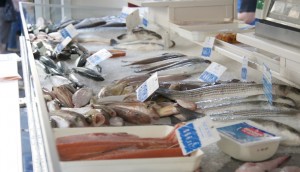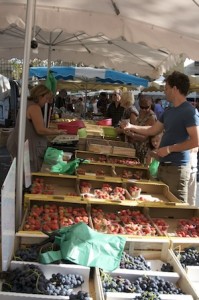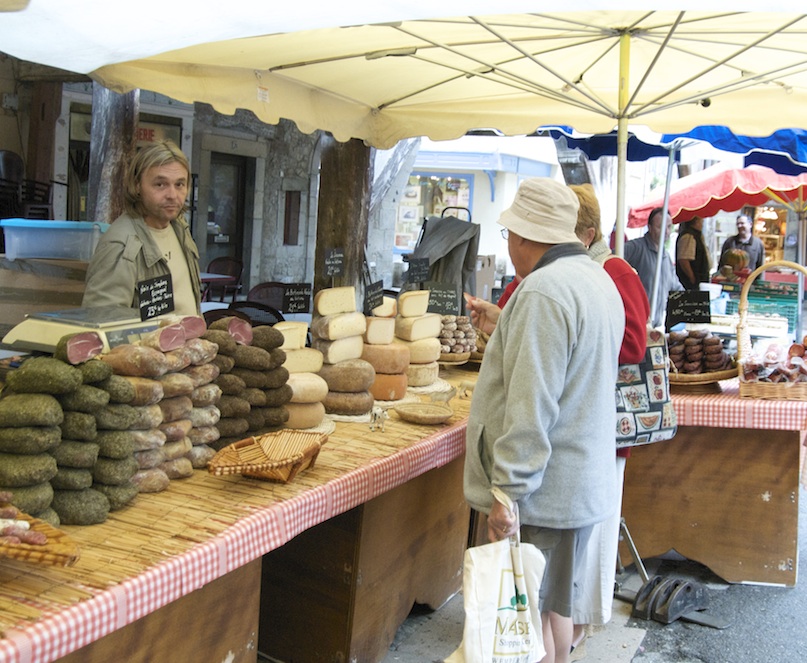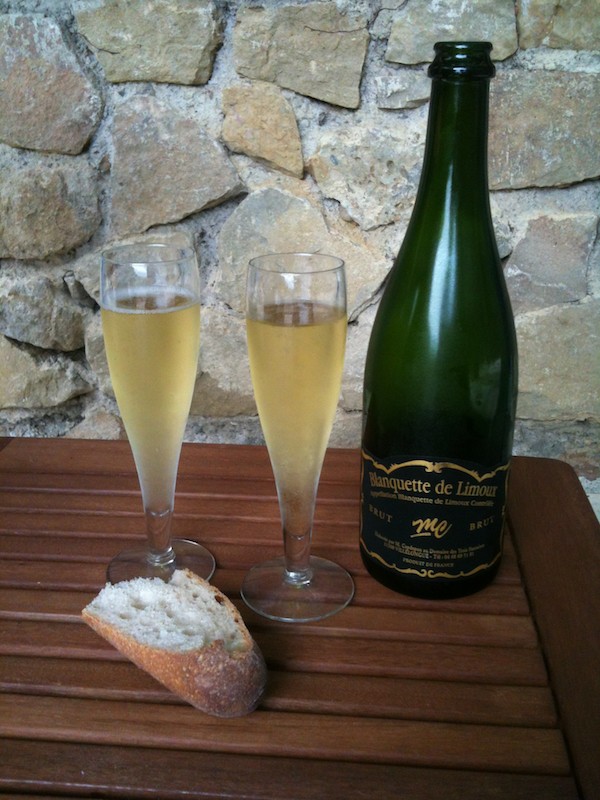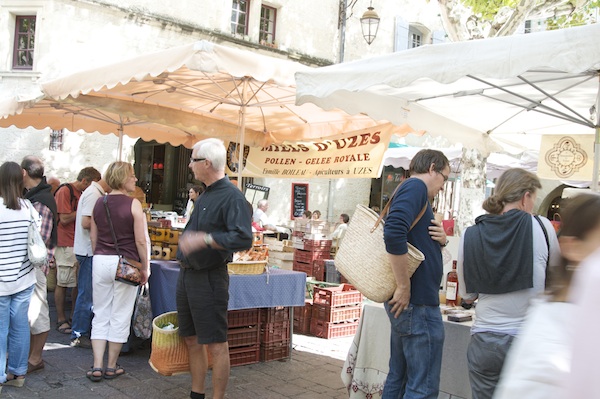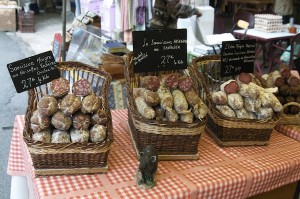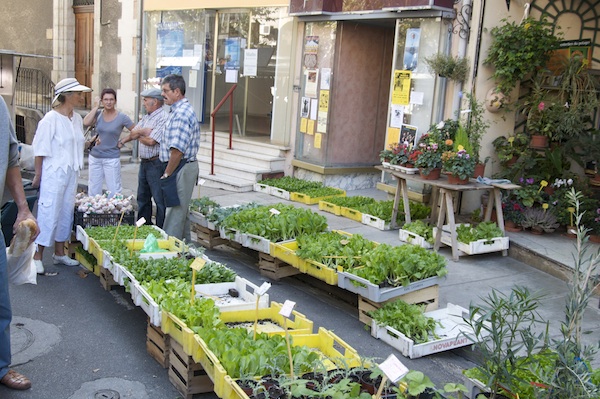(From October 2009)
I had visions of a scene of scarcely controlled panic; gendarmes racing into the Gare de Lyon, dressed in black, with bullet-proof face guards and helmets, barricading platform H (“’ashe”) with a phalanx of machine-gun–toting, shorn-haired, black-clad toughs legitimized solely by badges of state-approved authority and the smell of café espresse and camembert on their breath. La Sécurité (avec deux accents égouts) sending in a bomb team with dogs and defusers, and the entire station being placed under arrest. Everything brought to a standstill. Just like Paris under a transit strike. Or a health-care workers’ strike. Or a container-truckers’ strike. Or a taxi-drivers’ strike.
That, at least, might explain the utter dearth of taxis in all of Paris when we disembarked and most needed one.
But Gaston assures me that, no, the discerning French nose does not need a dog trained to explosives to recognize fine cheese, finer olives, and the other fine points and opportunities in life.
+++++++
Gaston, being a guy, is stoic and never cries—at least in any way that would be readily recognizable by a normal and normally sensitive human being or other mammal or even by an alien or reptile or microorganism.
But the result of our trip from Montpellier to Paris, even now, a full month after that fateful day, brings a suspicious mistiness to Gaston’s eyes and a tell-tale cherry-red runniness to his nose. And it’s not H1N1.
No.
Gaston likes his olives. Every Friday at home, charged with acquiring the week’s groceries as his contribution to household expenses, he returns from the local grocery store with a tubful of green-olives-stuffed-with-hot-pimentos or -whatever. ‘Whatever,” because I’m not especially into olives, so experience his weekly pickings only in how they take up valuable fridge space that could be used to house something far more essential—like humous or organic lettuces or home-made soup stock or ratatouille.
However, once or twice or thrice or more a day whilst it lasts, Gaston visits his fridge-stashed cache for an olive fix. He fills a specifically shaped bowl (not so large as to diminish their contents; not so small as to deprive him satisfaction of his craving) with the little green jewels and with pickled onions (another item of which I beg leave to have only a passing—a very passing by—olfactory experience), sits on the sofa and savours the flavours, smacking and snorting and chomping in his own private ritual of appreciation and appetite.
Thus, Gaston was very happy in France. Particularly so once we discovered the markets.
We would park our rental car in an unknown town listed as having a public “marché (accent égout) traditionnel” on the day in question and wander aimlessly until we spotted empty baskets moving ever further off ahead of us on the street on the arms of French madames and, eventually, full market baskets making their way towards us on the arms of other said French madames. In this way would we find our way to the town/village marketplace.
And, once in the environs of said marketplaces, Gaston’s finely tuned and highly sensitive olive detector would deploy, much in the way the Pentagon’s satellite dishes trackg terrorist cell-phone conversations, or a mule deer’s ears follow possible sounds-of-concern while it goes about its browsing-and-pooping business. Within moments, he would locate and plot the locations of the various and sometimes multitude local olive vendors…. And pass by, following in my wake, as I, a veritable French madame myself with my own woven-grass basket over my arm, beelined to the produce sellers and the cheese vendors and the sausage vendors, but looking archly out of the corner of his eye at the wares. (—Who am I kidding? That’s far too subtle for Gaston: he would rubber-neck and stare, imitating the aforementioned Pentagon satellite dishes and mule-deer ears—and drool!) We might pass by two or three times to compare prices of lettuce, of green beans, of fresh basil….
And then, bowing to the inevitable and the interests of maritable longevity, I would stop and turn to him: “How’s your supply?”
“I could do with a few more.”
And so it would begin, yet again, once again….
I ate more olives proffered by vendors in markets in France than cumulatively through the previous four decades: the latest year’s (meaning the year before’s, as the olive harvest occurs in November/December) own green olives preserved with fresh minced garlic—sure to ward off any popish, anti-paratge, anti-Cathar vampire; preserved with lemon—sure to preserve any vampire of any faith until… well, forever; preserved with hot pimento, sure to bring to mind every morning exactly where those pimentos originated after Christophe Colon’s discovery and explorations of the world’s ring of fire; preserved with sweet pimento, sure to… I’m not sure what; preserved with basil and bay; preserved with … whatever! And of course an entire selection of black olives, preserved in various and imaginative and surprisingly tasty ways…. Who knew?
We would stagger back to the car, the basket over my arm and a couple of plastic bags hanging from Gaston’s hands laden with vegetables, herbs, leafy greens, fresh bread, cheese, sausages and, to Gaston’s eager anticipation, at least four varieties of olives, and our stomachs laden with bits and pieces of almost all of the above.
Who needs lunch? Or supper, for that matter.
And, in the days following, we (read: I) would endure the familiar olive ritual, sometimes accompanied by the very fine local plonk fine du terroir or plonck finer de pays or plonck particularly vignoble (each and all for less than 5 euros per), sometimes by Belgian brew selected by Gaston at the local Carrefour or Super U, but always, always with a reverence not seen in Canada—ever.
He had a goodly supply remaining when we left the south for Paris. It was packed individually in a bag with a supply of brie, camembert and a couple of chèvres intended for lunch on the train and days of enjoyment thereafter.
And we did enjoy our lunch, leisurely, because what else were we going to do on the train? Other than watch the landscape unfold, 16th-century chateau upon chateau, 12th-century fortress upon fortress, field upon field, vineyard upon vineyard, wood upon wood, hilltop bastide upon hilltop bastide. Gaston especially reveled in his oleai europaeai and his stinky cheeses. When he had finally finished (“had finished,” as in the French—not “was finished,” meaning dead; “had full,” not “was full,” meaning preggies), he folded them back into the bag, which he then carefully and reverentially placed in the rack above our seats.
“That was a very enjoyable repast.”
Then: “Remind me not to forget these.”
The last time Gaston said, “Remind me not to forget…” to me when we were traveling was en route from Surabaya to Kuta in Indonesia. He had written notes in his journal (isn’t that quaint?) not particularly complimentary about some of the people and situations we had recently encountered and stuck it in the pocket in the seat ahead of him on the airplane, on which we were flying instead of taking the bus and ferry that sank with 600-some overloaded passengers aboard that same day.
And, frankly, I—and it is all about me, after all—don’t see why he doesn’t just learn to put things away where they belong right away, because he always, always forgets, and I have other things on my mind than to remind him to gather up his toys, journals, whatever (“whatever!”), and so we experience unnecessary pain/regret/apologies and a complete waste of emotion and energy. I have, finally after two decades years, come to accept that what Gaston does/says/thinks/doesn’t do/say/think is entirely his responsibility and nothing whatsoever (“whatsoever,” not “whatever!”) to do with me (even though everything else is, of course, all about me).
And so the train pulls into the Gare de Lyon—finally and after the scheduled, but still too long (if you regret leaving where you’re leaving and have difficulty sitting still for 1.5 hours, let along for), 3.5 hours—and we gather our suitcases and backpacks and our market basket full of preciously fragile (“L’argile, c’est fragile,”) Provencal pottery unlike any other you’ve ever seen anywhere—anywhere!,—and disembark among the hordes to take a taxi to our appointed (definitely not anointed) apartment, and find no taxis in service in all of Paris and so have to walk \six kilometres with wine bottle-stuffed luggage and basket of pottery through crowded, cobbled, disgustingly smelly, litter-scattered, people-clogged (did I mention crowded? Let me repeat: storefront-to-storefront-packed), sunny, gloriously warm, late-afternoon-Saturday streets (especially once we entered the Marais, the recently funkified fashion district where our apartment was located).
It wasn’t until the evening following, as I tried to prepare our evening meal in a ridiculously small kitchen with no counterspace whatsoever and refrigerator one-quarter the size of the average North American bar fridge, that the tragedy made itself unescapably, undeniably, and oh-so-heartbreakingly (to Gaston) known.
“This is going to take a while,” I said, pushing sweaty hair out of my eyes, trying to salvage a Spanish risotto burnt on the gas burner that operated at only very high or barely on, stirring the reduced tomato sauce on the one burner that did work, and trying not to shriek in frustration, rage and … whatever! “Why don’t you have some cheese and olives while I get this under control?”
“I can’t find them.”
“???”
“I think we left them on the train.”
“——. We?!”
“I could cry.”
“——”
“——”
“You left them on the train?!!”
“I’ve looked all over and through everything for them.”
“I did, too. Actually. I thought you might have them stashed somewhere”
“I wish. But I’m afraid the worst has come to pass: They were left behind. And I could just weep.”
And me, ever sympathetic in moment of crisis: “My god. An unidentifiable package on the TGV. After the Metro bombings and Spain and 9/11, they’d declare a national state of emergency…”
And so Gaston held forth, in the strong, masculine, stoic Way of the Guy, on his theory of the discerning nose of the SNCF-employed Frenchman, capable of sniffing out quality cheese and excellent olives whenever any of those presented themselves.
And, all the while, something suspiciously like a tear trembled and caught the light in the corner of his eye.
Disclaimer:
Events in this report may appear larger than they actually were in reality.

